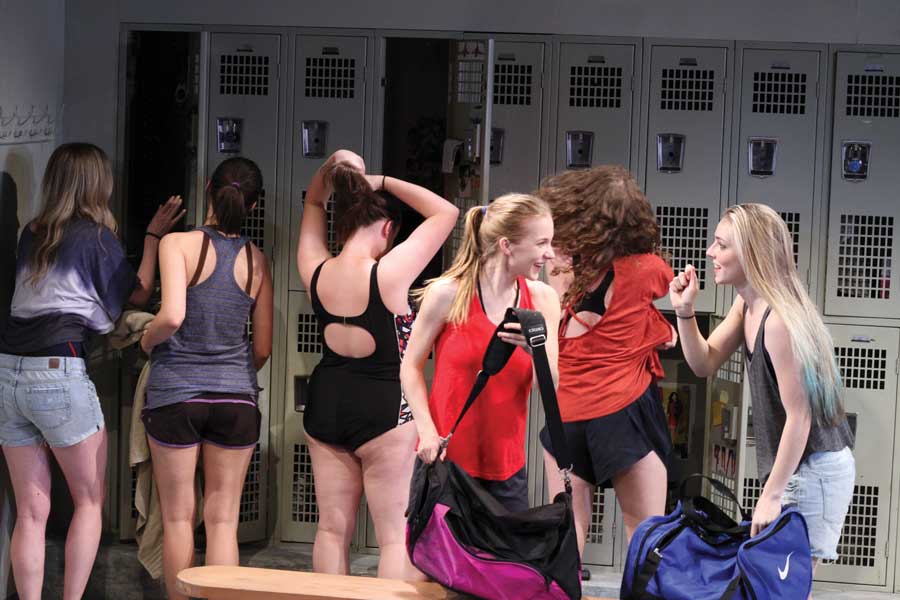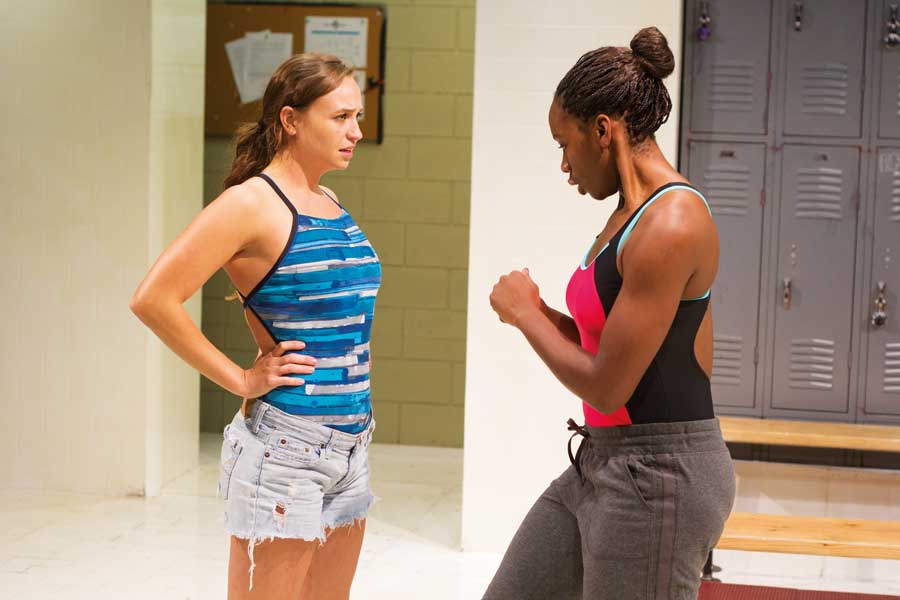Ruby Rae Spiegel and Lucas Hnath met in a playwriting workshop through Young Playwrights Inc. when Spiegel was in high school and Hnath was her teacher. Over the years, Hnath has served as a sounding board and mentor. Here he speaks with Spiegel about her play Dry Land.
The play follows high school swim teammates, Amy and Ester. Though the girls come from different backgrounds, they share a secret: Amy is pregnant and wants an abortion. While navigating high school friendships, relationships, and other sources of drama, the unlikely friends bond together to find a solution. The play premiered in New York at HERE Arts Center in a Colt Coeur production in 2014, and the play most recently ran at Company One in Boston in Oct. 2015.

LUCAS HNATH: How long did it take to write the play?
RUBY RAE SPIEGEL: It’s hard to know because I was writing it while I was at school, so I worked a lot off and on because I would have to study for a test or write a paper. I started it at the end of my sophomore year, and then basically finished a draft two months later and then didn’t look at it for a while.
Do you write in order or do you jump around?
I think I write in order—or, at least I write the core of the play in order. The first draft of Dry Land was a two-hander, so it was in order of the two main characters. And then I went back and wrote the two scenes with the two other characters because I first wanted to see what Ester and Amy’s arcs were.
Wait, so why did you have the impulse to add in other characters? When did I first read any of this?
I think you read it as a two-hander. Maybe it was even your idea to put in the boy character?
No, don’t blame that on me! I would never tell you to do something…
You’re always on me for being “precious” about my first drafts, so at least you were very good at pushing me to add characters, go to new places, etc.
Whenever we talk, I’m trying to listen for what you’re really saying underneath what you’re saying. I think you were feeling the need to bring in somebody else. But, this matter of being “precious,” do you still struggle with that?
I’ve tried so many things to work on that. Before I went to college, I was like, “I’m gonna join an improv group so that I have to come up with stuff on the spot and commit to it,” as a kind of exercise in not overthinking it. And now, writing for a TV show [“The OA,” a new Netflix series], I’ll be curious to see if I’m better at committing to ideas and following through on them. In the writers’ room, they just assign you pages for the show and you have to write them on a short deadline—so you can’t be precious in that way. But it’s very different when it’s your own work. Part of writing a play, for me, is trying to figure out what I am truly interested in—what is the core strangeness/tension/beauty of an idea or a feeling that compelled me to spend so many hours sitting in it. But it’s hard in the beginning because, for me, the best writing starts with a feeling, and the process of creating the work is a kind of dance of groping your way through the dark.
I’m curious to hear you talk a bit more about the role of the body in your work. What does it do?
You only have a few things to play with onstage, so I always get frustrated when it’s just people sitting at a table. It’s always a helpful theatrical device to have people in a bodily crisis because it can create an arresting image onstage, and become something that is exchanged and negotiated between the two characters. The pressure on us to maintain our bodies as distinct and self-policed entities separate from one another is something that I’m interested in pushing back on.
Yeah, there’s always some coercion of the body happening, and it’s a complicated one because many times it’s violent. And then there’s also something deeply, strangely affectionate happening simultaneously.
Exactly. Like, punching a stomach—that’s how the play started for me, with that action in my mind. For Amy, the punches are both painful and perhaps, at times, masochistic, while also allowing a greater sense of relief and freedom for her. They’re also, to me, a gateway drug to the physical intimacy of Ester and Amy lying on one another and Ester shaving Amy’s back.
My short play Carrie & Francine started because I researched these pro-anorexia, pro-bulimia websites, where they give you “tips and tricks” on how to maintain your eating disorder. I was surprised and moved by the mixture of bodily cruelty that they were advocating while being so supportive of each other. That felt very gendered—the ways that women are physically affectionate toward each other, and also very hostile toward each other’s bodies and their own.

It sounds like the experiment you’re trying is you’re seeing how far you can push something and still empathize with it.
Exactly, which is true of the character of Amy. There’s this strong cultural narrative of the girl who had sex for the first time, who’s very virginal and was perhaps coerced into sex by an older guy, and then suddenly she’s pregnant. And that’s the kind of character that’s been centered in an empathic narrative of abortion that affirms ideas of purity and all that. And so I tried to work against that model in writing Amy. It was important to me that she’s risky with her sexuality and that she is or has tried to carve out a performative sexual identity for herself that pushes against the idea of female purity.
Yeah, there’s a desire to use dramatic form as a way to get people to see the world with new eyes.
There, you’ve said it.
So you’re in a TV writers’ room now—how does it feel different from writing a play?
It’s so relieving in a certain way, because it’s not my original work, and my name is not on it. So I feel like, in a certain way, it’s like a great writing class—I get to experiment, explore. It’s also just been a really nice space to prove to myself that I can actually write in wildly different styles—science fiction, try to embody the voice of a middle-aged Midwestern father, etc. Also, we just debate stuff. So I’ve learned how to debate structure.
Tell me more about that.
You’ve always told me that being more articulate about what you’re trying to do was helpful because playwriting is a social job, and being clear with collaborators is so important to having your work done the way you want. With my own stuff, I live very much within my head, so I just can go off of a feeling that I have that something doesn’t work, whereas with the TV show, I have to argue why something doesn’t work for a whole room of people.
I’m curious—this act of becoming more conscious about structure and form; is there a fear that it’s going to take something away from your writing process?
A lot of writing for me is manufacturing different head spaces for myself, and so I have certain lists of different writers that I read when I’m trying to pivot out of a head space, especially at school, because that’s such a different head space that you have to be in, to be a good student. So I’m curious to see how I’m going to unlearn some structural/Aristotelian awareness so that I can just be in a fresh head space. All this articulation will probably make me a better reviser, which is good. I don’t want to stray too far from the core voices that I feel like I specifically can express now that I have more of an ability to slip into voices that I would never think to write.
Annie Baker—I think it was the “Studio 360” podcast—was talking about The Flick, about how film and playwriting are actually quite different, whereas playwriting and music are more similar. And I think that that really rings true to me. Dialogue feels like the stuff of plays, whereas the scene directions feel like the stuff of film.
The montage, the assembling of those disparate parts.
Yeah, or even, like, “She bites down on the pear—it’s bitter” is so much more important in film, and says so much more, because you’re closer to that action. Whereas that would be totally lost in theatre. That was something that I learned early on in Carrie & Francine. It ends with the two of them moving their hands towards each other and holding hands, and I think that that worked in a very small theatre, but probably only would work there. I had to reread it the other day, because it’s going to be published in this series of one-acts, and it’s just mortifying. Like, are you mortified by your plays that you wrote five years ago?
Of course! It’s hard to look at a lot of my older plays. It makes me ill.
Yeah! It’s sickening. That’s why I’ve written so many half-plays that I never finish. Also part of why I’m bad at revising—I just don’t want to read my own words a hundred times. A lot of my drive to polish lines is just to make them less revolting for me to read over and over again.
Yeah, but if you stick with it and then work your way through the things that are making you cringe, then it elevates it. It becomes a diamond. So it’s worth sticking to it.
Lucas Hnath is a playwright. His play The Christians is running at the Mark Taper Forum in Los Angeles Dec. 2, 2015–Jan. 10, 2016.


